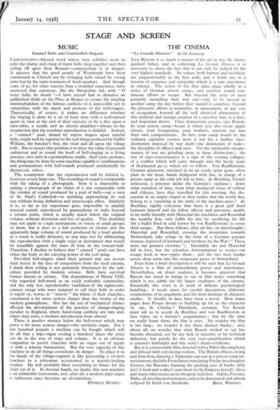STAGE AND SCREEN
MUSIC
Canned Bells and Counterfeit Organs CAmPANoLoGv—blessed word whose very syllables seem to echo the clump and clang of many bells rung together and then tailing off upon their Rounds—campanology is in danger. It appears that the good people of Weymouth have been summoned to Church not by swinging bells raised by strong arms but by the static trumpets of loud-speakers. And though some of us, for other reasons than a troubled conscience, have answered that summons, like the Shropshire lad, with " 0 noisy bells, be dumb "—I have myself had to abandon an unfinished drink on the Place at Bruges to escape the jangling tintinnabulation of the famous carillon—it is impossible not to sympathise with the alarm and protests of the bell-ringers. Theoretically, of course, it makes no difference whether the ringing is done by a set of lusty men with a well-earned quart in view at the end of their exercise or by a disc upon a turn-table, a needle and an electric amplifier—always on the assumption that the resultant reproduction is faithful. Indeed, a " canned " peal, tinned by expert ringers upon tuneful bells, might well be superior to the real thing produced by Gaffer William, the butcher's boy, the vicar and all upon the village bells. But to accept that position is to deny the value of personal endeavour and to sound the knell of bell-ringing as a living practice, save only in a gramophone studio. And there, perhaps, the thing may be done by some machine capable of combinations and permutations with bell-sounds produced synthetically by thermionic valves.
The assumption that the reproduction will be faithful is, however, a very large one. The recording of sound is comparable with the taking of a photograph. Now it is impossible to enlarge a photograph of an object of a size comparable with the volume of sound produced by a peal of bells—say a view of St. Paul's Cathedral—to anything approaching its real size without losing definition and stereoscopic effect. Similarly it is, so far as my experience goes, impossible to amplify musical sounds reproduced by gramophone or radio beyond a certain point, which is usually much below the original volume, without distortion and loss of quality. This disability may not apply to single instruments or voices or small groups of them, but it does to a full orchestra or chorus and the apparently large volume of sound produced by a loud speaker in a room is really delusory, as you may test by obliterating the reproduction with a single voice Or instrument that would be inaudible against the mass of -tons in the concert-hall. Therefore, I decline to believe that " canned " peals can have either the body or the carrying power of the real thing.
Provided bell-ringers stand their ground and can recruit their forces in the face of competition from the local cinema, I think their calling is not genuinely threatened by the sub- stitute provided by modem science. Bells have survived former threats as serious. The depredations of Henry VIII, who regarded bell-metal as an easily realisable commodity, and the only less reprehensible vandalism of the eighteenth- century clergy who were tempted to sell their bells in order to repair or, worse, to " restore " the fabric of their churches, constituted a far more serious danger than the rivalry of the modern gramophone. Nor has the use of mechanical chimes affected the development of the practice of change-ringing peculiar to England, where hand-rung carillons are rare and, where they exist, a modern introduction from abroad.
There is another menace below the bell-tower which may prove a far more serious danger—the synthetic organ. For a few hundred pounds a machine can be bought which will do all that a pipe-organ costing a hundred times the price can do in the way of stops and volume. It is an obvious temptation to parish churches with an organ out of repair or with a wheezy harmonium. But the very capacity of this machine to do all things constitutes its danger. To place it in the hands of the village-organist is like presenting a r2-inch howitzer to a tribesman accustomed to a muzzle-loading musket. He will probably blow everything to blazes for the sheer joy of it. In discreet hands, no doubt, this new machine Is an admirable instrument, and, after all, a modern pipe-organ m indiscreet ones becomes an abomination.
DYNELEY HUSSEY.






































 Previous page
Previous page